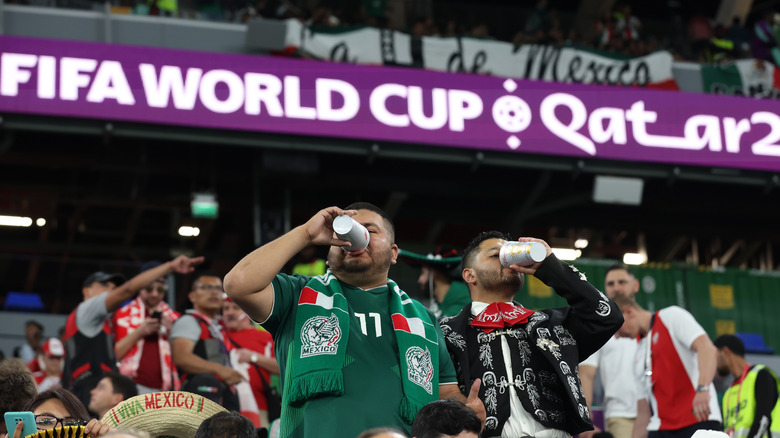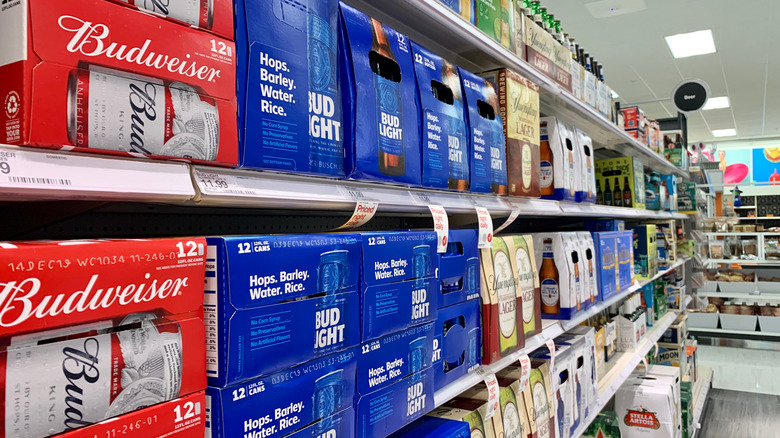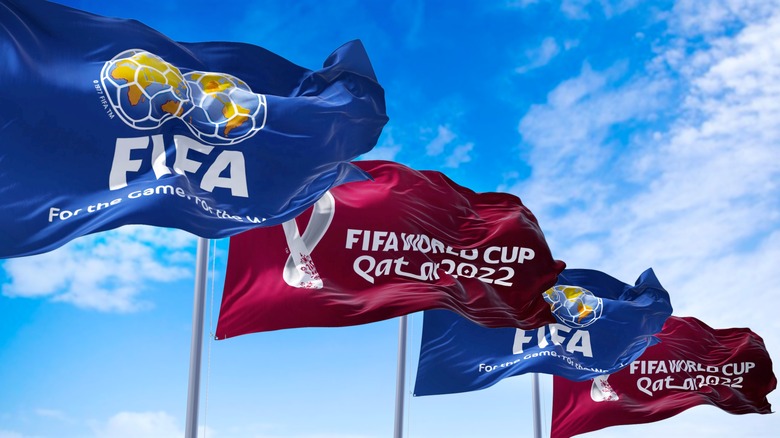Budweiser's Response To The Qatar Beer Ban At The World Cup
Beer and sporting events go together like, well, beer and sporting events. Fans love nothing more than watching their favorite teams fight to the figurative death while clutching a frosty cold one, particularly when it comes to soccer matches.
The true football — the U.S. is really the only place where the sport is called soccer — has a reputation for rowdy fans and their often-problematic behaviors. At a September soccer match in France, rowdy behavior led to significant injuries before the game even started, People reports. Fears about beer consumption fueling fan violence are pretty standard, but news regarding beer sales at the World Cup in Qatar are a lot more complex.
According to a FIFA statement released on November 18, the sale of beer will be prohibited within Qatar stadiums during the 2022 World Cup. Alcohol can still be enjoyed at the FIFA Fan Festival and other locales, but not within the stadiums themselves. As reported by Euronews, FIFA president Gianni Infantino was quoted as saying, "If for three hours a day you cannot drink a beer, you will survive." Infantino also alluded to possible fan violence and cited a few other countries that ban alcohol sales in stadiums. However, AP News highlights Qatar's status as a "Muslim nation" with laws against drinking in public places. The last-minute decision has many fans riled up, but it appears Budweiser has the most to lose when it comes to the beer ban.
A deleted tweet is never truly gone
Reuters provides some insight into Budweiser and its role as a World Cup sponsor, which it has held since 1986. The brand had exclusive permission to sell beer within eight stadiums where the tournament is taking place, only to find out that alcohol was banned just days before the World Cup was slated to begin.
Anheuser-Busch InBev, which owns Budweiser, usually sees a massive boost in sales thanks to World Cup events. (Consider that in 2014, the brewery experienced an increase of 140 million liters consumed during the Brazil-hosted tournament, per Reuters.)
Based on these sales figures, one could assume that Budweiser and Anheuser-Busch InBev are not thrilled with the development. According to The News & Observer, Budweiser's original response to the decision was a tweet that simply read "Well, this is awkward...", which has since been deleted. The brand followed up with a far more diplomatic message that highlighted its partnership with FIFA and alluded to "circumstances beyond our control."
A World Cup rife with controversy
The World Cup beer ban is only the latest in a seemingly endless list of controversies surrounding host country Qatar. Forbes lists a few of the other occurrences that made headlines, including complaints about discriminatory practices involving women and fears about legal action against LGBTQ fans. Then there was the massive death toll of thousands of Indian workers tasked with constructing the stadiums where the tournament was to be held.
In light of these situations, a beer ban doesn't seem quite as important. In fact, Budweiser attempted to make light of the development, according to The Guardian. The brewer posted a later tweet that claimed the country that wins the World Cup will be the lucky recipient of all the surplus beer slated to be sold in Qatar. And fans attending the tournament can still enjoy certain Budweiser offerings, namely the non-alcoholic Bud Zero.


